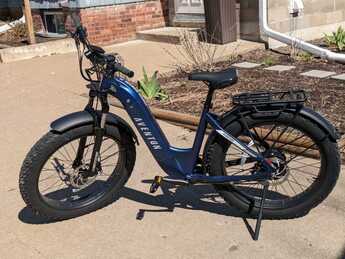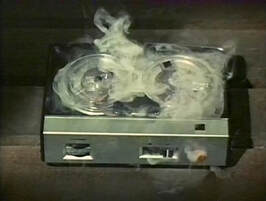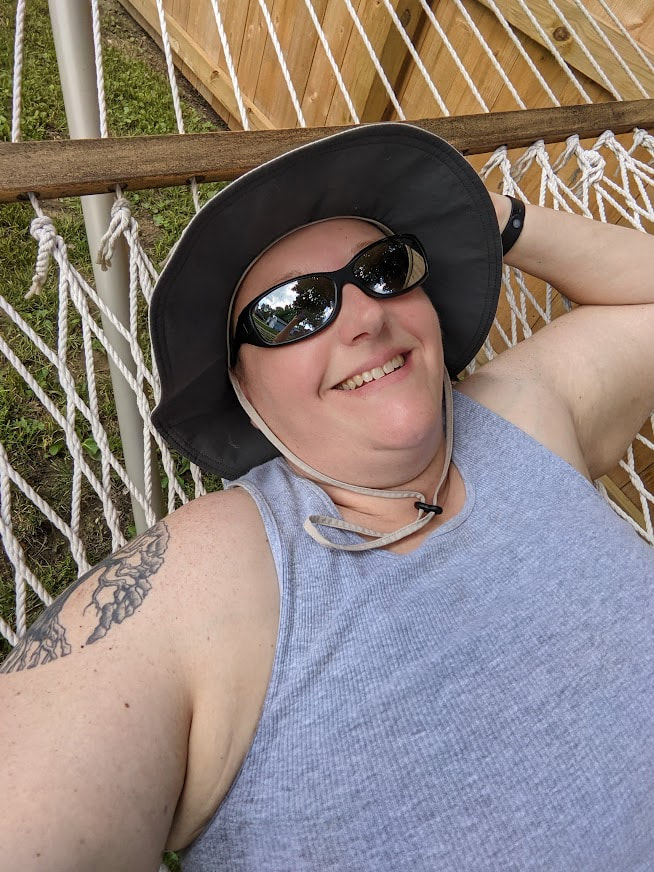 Several years ago I rode my bike everyday during the spring and summer when I got home from work. Sometimes I rode 10 miles, sometimes I rode 20 miles, but I always rode. I rode a few times with friends, a few times with a local bicycle club that would ride to the next town over, have pizza and beer, then ride back home. But most of the time, I rode alone. Just me, the open road, and my Trek. Since I have always had terrible joints, bicycle riding seemed like the thing for me to try. I was also trying really hard to take better care of my health and, again, bicycle riding seemed to check that box. So I ditched the Huffy I had from my college days, and saved every extra penny I had for a new bike at the local bike shop. That summer would lead me to the healthiest weight I had been in years, it would lead me down many county roads across Iowa, it would lead me to my first pair of spandex shorts ever (YIKES!), and it would lead me to riding a leg of RAGBRAI with my eldest brother, Stacy. It would be a great story if it stopped there, but it didn’t. I didn’t keep riding my bike after RAGBRAI. Over the years I would ride in spurts–riding for a handful of days or even weeks, only to put the bike back in the garage. When we moved here from Ames, I rode the bike trail here in town a couple of times, and rode my bike to work a few other times, but it was certainly nothing to write home about. Then, in the summer of 2022, I tore the horn of my meniscus in my right knee. A process of scans and specialist visits revealed not only this, but also pretty advanced osteoarthritis. I underwent injections, months of physical therapy, and had even scheduled a pretty radical surgery to prolong the life of my knee with a sports medicine surgeon at the University of Iowa which I would, inevitably, cancel. There was a lot in my life that was up in the air during that time, but one thing became crystal clear rather quickly: My bicycling days were over…or so I thought. The problem wasn’t that I couldn’t ride a bike anymore, the problem was that I couldn’t get started on a bike anymore. The force required to start out from a stop sign or on an incline (the kind of inclines not in short supply here in town) put a painful pressure on my knee that made riding a bike less than pleasurable for me. So I filed bicycle riding under “Things I can no longer do,” and went about my life–a little less happy. A little less healthy. A little more trapped in a body that felt like it didn’t let me choose another path. As I processed this resignation with trusted others, I admitted that I still had dreams of riding a bike again. I told them of all the days I thought about “some day,” out in the future, when I figured out how to ride once more. You know, that “later, magical day” when I had a different body, with a different knee, that allowed me to ride my way into better health. I wasn’t sure if that day would actually come, but I was living those magical future days in my head nonetheless. One day, one of these trusted others asked me, “So, you want to be a person who rides a bike?”. I looked at this person blankly, as if to say in my best Chandler Bing sarcasm, “Could I BE any clearer?” I responded, “Yeah, but that’s not an option right now.” Then they replied, “Yeah, but…what if you just became a person who rides a bike?”. They went on to say that I could spend my energy figuring out how to keep living in my head and in some made-up, future reality, or I could spend my energy actually being a person who rides a bike. I thought that was completely ridiculous and OVERLY simple, but it turned out to be genius. I remembered someone at the church sharing about an electric bike they and their spouse had purchased and had liked, so I started researching electric bikes. I learned that electric bikes aren’t motorized scooters, they provide varying degrees of electric assistance when needed–like when starting out at a stop sign or on an incline. I spoke to my doctor and my spouse, and everyone was on board with me saving up for an E-bike of my own–just like I had saved up for that Trek almost two decades before. But purchasing an e-bike didn’t make me a person who rides a bike…I had to get on. To be a person who rides a bike, I had to put those grandiose, made up, future realities away, and just ride one time. Then, the next day, when I still wanted to be a person who rides a bike, I had to make the choice to get out of my head and get onto the bike another time. And another. And another. Until I have finally realized that to be a person who rides a bike means making the choice, in each moment that I can, to just get on the bike and ride. You know, Jesus called his disciples to follow him not by painting some big, amazing, future reality with a really fancy vision statement, but by saying two words: “Follow me.” And then, over and over again, presenting those who said they wanted to be people who followed Jesus with opportunities to actually follow. Through caring for the poor they encountered. Through tending to the outcasts that they met along the way. Through feeding those who were hungry in their midst. Every encounter, an opportunity to not just be a person who wants to follow, but to be a person who actually follows. Whether you are a person who wants to follow Jesus or a person who wants to ride a bike, workout more, gossip less, laugh more–whatever–the decision is not something that you make one day. Neither is it something that will only happen on some future day when all the stars align and everything is finally as it should be. Being a person who follows Jesus or rides a bike happens only when we actually follow. When we actually ride. When we just do the thing when the opportunity to do it presents itself. It is a choice we make in moments–over and over again–instead of a one and done sort of thing. So this week, friends, I encourage you to join me. Follow Jesus. Get on the bike. Go to the gym. Keep the juicy gossip to yourself. Let the belly laughs roll. Don’t think about it or dream about it or talk about how your life will be so different one day when you do the thing, do it now. Then, get up the next day and do it all over again. It’s as simple as that…it’s as hard as that. On the journey with you, Pr. Melissa  When I was growing up, we watched Mission Impossible. No, not the one with Tom Cruise, but the one with Barbara Cain, Greg Morris, and Peter Graves (to name a few). Of course, these were reruns–the show first aired in 1966–but it was a show my entire family could watch together and was something we all enjoyed. My favorite part of each episode was in the beginning when the team would listen to the recorded message of their mission and we all would hear those famous lines: “Your mission, should you choose to accept it, is to…” and then it would end with “This tape will self-destruct in 5 seconds.” Self-destruction isn’t something we like to think about. We live in a culture that is all about self-help, self-care, and self-improvement–ways we think, perhaps, that self-destruction will be staved off. Like if we just read the right book or put the right thing on our vision boards or lose that stubborn 15 pounds and practice deep breathing and being kind we will somehow be able to hold back the tidal wave that always seems to be waiting in the wings to bury us–ready to destroy us if we stop helping, caring, and improving ourselves. And yet our faith tells us that these self-preserving exercises miss the point entirely. In the Bible, we often read about a call to repentance, and sometimes we understand this call to be about self-improvement, but it’s about SO MUCH MORE. The Greek word often used for repentance in the Bible is μετάνοια or, written using the English alphabet, metanoia (pronounced met-a-NOY-a). It literally means "change of mind," but it’s not like the kind of change of mind one makes when deciding to have an English muffin instead of a bagel. It is the kind of change of mind that completely changes a person–heart, mind, and spirit. Which is likely why, when trying to remember this word and what it means while in seminary, many of us used the phrase, “Metanoia will destroy ya” as a mnemonic. I always think the mnemonic better captures the essence of what the word means than the literal definition. No matter how you slice it, dice it, or define it though, make no mistake, metanoia–repentance–will destroy you, or at least the current, self-focused version of you. And in our self-preservation obsessed culture, we will do our best, and our worst, to avoid this kind of destruction. We will double-down on beliefs that we have held for a long time, no matter how limiting or absolutist they may be. We will conserve, at great cost to ourselves and our relationships, our deepest held convictions. We will twist and turn and pretzel ourselves until we can find a way to suggest that these convictions and ideals mirror the mind of God. We will, in a very real way, “self-destruct,” and we will do this most assuredly whenever we are asked to consider those we might refer to as our “enemies” or our “opponents.” The cool thing about repentance, and the really hard thing about it as well, is that it’s a little more involved than simply choosing the English muffin instead of the bagel. It is God’s work done in us, but only done with our consent. It’s as if God hears us reading scripture passages like John the Baptist calling for a baptism of repentance, or hears us lamenting about the polarized state of the world or our communities or our families, and God says, “Okay, here’s this person who voted for the person you can’t stand in the last election. Here’s the person who owns as many guns as they can while you don’t allow guns in your home. Here’s this person who wants a total ban on abortion when you want women and their doctors to be able to decide what’s best for their healthcare. Here’s this person with whom you disagree about something. Here’s ALL these people with their equal and opposite beliefs, now ENCOUNTER THEM. Have an ACTUAL RELATIONSHIP with them. Then see what you think and believe then.” Because it’s more difficult to hate someone you know. It is more difficult to endorse laws that hurt someone you care about. It is more difficult to make monsters out of another human being when you’ve broken bread, raised a glass, or swapped stories with that human being. It’s more difficult and, potentially, more destructive. But destructive in the very best way. See, when we consent to God’s work in us and then we place ourselves in positions where we have relationships beyond those we have with people who are just like us or people with whom we easily agree, we often find that our beliefs about others who hold different beliefs and come at life from different vantage points than our own really have nothing to do with who they actually are or the reality of their lived experiences. We often find that the stories we’ve been telling about them in our own minds look nothing like the people we meet and actually get to know. Such knowledge completely destroys us–not by breaking us down, but by breaking us open to the possibilities that lie just beyond all that our limiting beliefs would ever let us see or consider. All of this leaves me to wonder if repentance–metanoia–might actually be the thing that helps make us whole. If metanoia will, in fact, destroy our self-preserving, limited belief-holding selves, might it also help destroy the echo chambers we’ve created or the trenches we’ve dug on opposite sides of some imaginary line? What if metanoia–repentance–is not just some churchy word we talk about sometimes during worship, but is the fullest representation of who we are as Church? I’m not sure, but I want to find out…join me? This message will NOT self-destruct in 5 seconds (or at all)...perhaps we shouldn’t either. Pr. Melissa  t’s a strange thing–the human heart. Just when you think it’s impossible for it to stretch one iota more, its tattered edges find a way to expand even by the tiniest of margins. It’s truly a remarkable thing…not to mention a thing that is so often overlooked. Many of you know that our nearly 20 year-old dog, Dexter, died a few weeks ago. Many of you have reached out to our household in person, on the phone, in a message, or in a card. Many of you know how difficult it has been saying good-bye to Dexter. Many of you get that, for me at least, he, and Murphy before him, and Odie before him, were never “just” dogs. They were family members of another species–pieces of my life and my heart that grew me and taught me to love in ways that no human ever could. Like I said, the human heart is strange indeed. The heart is quite a mysterious thing. Throughout the ages, various groups have tried to pin down exactly what the heart is and what it does. The Ancient Egyptians came to understand the heart as the seat of both life and morality. Early Greeks saw the heart as that which kept the body supplied with heat. Aristotle and his fellow philosophers thought the heart controlled reason, thought, and emotion. While the Stoics believed that the heart was that place within us in which the soul resides. But even with all of our hypotheses, a bit of mystery remains about how the heart is significant to our human condition. All we know is that it is. And it’s not just significant to us, it’s significant to God. Maybe that’s why every year on Ash Wednesday the reading from the First Testament is always from the prophet Joel where it is written, “Yet even now, says the LORD, return to me with all your heart.” Our hearts are so significant to God, the prophet tells us, that God wants all of those tattered, stretch-marked pieces of our hearts scooped up and brought back to the One who made us so that they–too–can be shaped, formed, expanded, and made new. It’s strange, sad, and beautiful all at the same time, and it is exactly how our hearts are designed to work. I recently read a book by Maggie Smith. In the book she writes of the human heart’s design and the ways that even the language we use to describe our hearts often runs counter to the strange and wonderful nuances of this creation. Smith calls this to the reader’s attention by saying, “Stop calling your heart broken; your heart works just fine. If you are feeling--love, anger, gratitude, grief--it is because your heart is doing its work. Let it.” This is, perhaps, the strangest thing of all: A feeling heart–even if feeling tattered and shattered–is not broken…it is working as intended. Which means, dear reader, that perhaps the only thing preventing ALL of our hearts from being returned to God is not because we have lost a piece or two along the way. Rather, it’s because life and love and grief and loss have left us walling off areas of our own hearts rather than feeling the pain of the heart–in all of its strange fullness–doing its work. Maybe the problem is that we keep fighting the heart’s natural design to feel the full range of human emotion when all we have ever been asked to do is let our hearts simply go about their work. Letting our hearts do their work means allowing ourselves to be and to feel more than one thing at once. It means letting gratitude and fear cohabitate knowing that it may feel like an absolute mess, and also knowing that our hearts are uniquely made for the mess. It means letting despair and hope sit face-to-face in the same booth, and also knowing that our hearts are made precisely for tables like these. It means letting grief and love dance together, and also knowing that our hearts are only in perfect rhythm when they do. For me, it meant grieving Odie, while welcoming my spouse into my life. It meant being so horribly sad over Murphy’s death in 2021, and being completely captivated by Hank and his love of belly rubs. And this weekend, it meant letting the lump in my throat from Dexter’s death be present as we met and adopted June. It might be strange, but it’s what we’ve got to work with in this life. I don’t want to waste anymore time fighting the design of my heart. I want to do my very best to simply let it do its work–its wonderful, maddening, terrible, fantastic, shattering, and healing work. I hope you’ll join me. Learning to let my heart do its work with you, Pr. Melissa |
Rev. Melissa Sternhagen
Rev. Melissa Sternhagen was called as the pastor of St. Paul Congregational UCC in June of 2020. Prior to her call to St. Paul, Pr. Melissa worked as a hospice chaplain in the Ames, IA area, following pastorates at rural churches in Central Iowa and Southern Illinois. Pr. Melissa is a second-career pastor with a background in agribusiness and production & supply operations. She received her M.Div. from Eden Theological Seminary in St. Louis, MO, and holds a MA Ed. in Adult Education and Training, and a BA in Organizational Communications. Archives
July 2024
Categories |

 RSS Feed
RSS Feed
